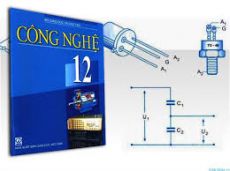Đề thi HK1 môn Tiếng Anh 10 năm 2021-2022
Trường THPT Lê Lợi
-
Read the following passage and do the tasks below
The traditional American family
The nuclear family, consisting of a mother, father, and their children, may be more an American ideal than an American reality. Of course, the so called traditional American family was always more varied than we had been led to believe, reflecting the very different racial, ethnic, class, and religious customs among different American groups, but today diversity is even more obvious.
The most recent government census statistics reveal that only about one third of all current American families fits the traditional mold of two parents and their children, and another third consists of married couples who either have no children or have none still living at home. An analysis of the remaining one third of the population reveals that about 20 percent of the total number of American households are single people, the most common descriptor being women over sixty-five years of age. A small percentage, about 3 percent of the total, consists of unmarried people who choose to live together; the rest, about 7 percent, are single parents, with at least one child.
There are several easily identifiable reasons for the growing number of single-parent households. First, the sociological phenomenon of single-parent households reflects changes in cultural attitudes toward divorce and also toward unmarried mothers. A substantial number of adults become single parents as a result of divorce. In addition, the number of children born to unmarried women who choose to keep their children and rear them by themselves has increased dramatically. Finally, there is a small percentage of single-parent families that have resulted from untimely death. Today, these varied family types are typical and, therefore, normal.
In addition, because many families live far from relatives, close friends have become a more important part of family life than ever before. The vast majority of Americans claim that they have people in their lives whom they regard as family although they are not related. A view of family that only accepts the traditional nuclear arrangement not only ignores the reality of modern American family life, but also undervalues the familial bonds created in alternatives family arrangements. Apparently, many Americans are achieving supportive relationships in family forms other than the traditional one.
Câu 1:
Which of the following is the main topic of the passage?
A. The traditional American family
B. The nuclear family
C. The current American family
D. The ideal family
-
Câu 2:
The word “current” in paragraph 2 could best be replaced by which of the following?
A. typical
B. present
C. perfect
D. traditional
-
Câu 3:
The word none in paragraph 2 refers to ..................
A. parents
B. couples
C. children
D. families
-
Câu 4:
How many single people were identified in the survey?
A. One third of the total surveyed
B. One fourth of the total surveyed
C. One fifth of the total surveyed
D. Less than one tenth of the total surveyed
-
Câu 5:
Who generally constitutes a one-person household?
A. A single man in his twenties
B. An elderly man
C. A single woman in her late sixties
D. A divorced woman
-
Câu 6:
The word undervalues in paragraph 4 is closest in meaning to ....................
A. does not understand
B. does not include
C. does not know about
D. does not appreciate
-
Câu 7:
The passage discusses all of the following reasons for an increase in single-parent households EXCEPT?
A. a rising divorce rate
B. death of one of the parents
C. increased interest in parenting by fathers
D. babies born to single women
-
Câu 8:
With which of the following statements would the author most probably agree?
A. There have always been a wide variety of family arrangements in the United States
B. Racial, ethnic, and religious groups have preserved the traditional family structure
C. The ideal American family is the best structure
D. Fewer married couples are having children
-
Choose the word or phrase among A, B, C or D that best fits the blank space in the following passage
The Buddha of the Poor
More than 26,000 children now have bright (09)…………………..faces after receiving free operations. About 173,000 poor people received free treatment to regain their vision, and nearly 3,400 deaf children were given hearing aids. These are part of the (10)………………………..of the Ho Chi Minh Association for Support of Poor Patients, launched and run by Mr. Nguyen Vinh Nghiep. Mr Nghiep, the former Chairman of the People’s Committee of Ho Chi Minh City, retired in 1992, and (11)……………………his Association two years later. Together with his former colleagues, Mr Nghiep has (12)……………………… billions of VND from individual (13)……………….and organizations to support more than a million poor people nationwide through seven major (14)………………….programmes, such as “ For the children’s smile”, “Bringing light to poor blind people from birth”., “ Sound and Vouce for Deaf and Dumb Children”, : Wheelchairs for people with disabilities and paralysed children”.
The “ Free meals for patients and their relatives” programme has offered over 2.6 million free meals to poor people in 10 hospitals. Mr Nghiep said, “Helping one person to gain their (15)………means bringing happiness to him or herself, freeing two or three more people from (16)………………of the patient, and more importantly, building (17)…………………..for poor patients in society.”
In 2002, Mr Nghiep, (18)……………. “The Buddha of the Poor”, was given the national title of Labor Hero in the Reneval Process, and his Association received the title in 2005.
Câu 9:
(09) ...................
A. smile
B. smiles
C. smiling
D. smiley
-
Câu 10:
(10) ...................
A. acts
B. acting
C. actions
D. activities
-
Câu 11:
(11) ...................
A. established
B. set
C. put up
D. opened
-
Câu 12:
(12) ...................
A. raised
B. got
C. risen
D. requested
-
Câu 13:
(13) ...................
A. donating
B. donors
C. donations
D. charities
-
Câu 14:
(14) ...................
A. human
B. humanity
C. humanities
D. humanitarian
-
Câu 15:
(15) ...................
A. eyes
B. eyesight
C. views
D. ability
-
Câu 16:
(16) ...................
A. looking after
B. dealing with
C. taking care
D. taking place
-
Câu 17:
(17) ...................
A. trust
B. hope
C. future
D. dream
-
Câu 18:
(18) ...................
A. knowing
B. known as
C. regarding as
D. regarding
-
Choose the letter A, B, C or D to complete the sentences with given words
Câu 19:
I/ not/ think/ women’s/ natural roles/ be/ care-givers/ housewives
A. I not think that women’s natural roles are care-givers and housewives.
B. I not think that women’s natural roles is care-givers and housewives.
C. I don’t think that women’s natural roles is care-givers and housewives.
D. I don’t think that women’s natural roles are care-givers and housewives.
-
Câu 20:
Women/ be/ hard-working/ than/ men/ although/ they/ be/ physically weaker.
A. Women are more hard-working than men although they are physically weaker.
B. Women are more hard-working than men because they are physically weaker.
C. Women are hard-working than men because they are physically weaker.
D. Women are hard-working than men although they are physically weaker.
-
Câu 21:
Men/ should/ share/ housework/ tasks/ wives.
A. Men should to share housework tasks with wives.
B. Men should share housework tasks to their wives.
C. Men should share housework tasks to wives.
D. Men should share housework tasks with their wives.
-
Câu 22:
Women/ usually/ get/ less/ pay/ men/ for/ do/ same job.
A. Women usually get less pay than men for do the same job.
B. Women usually get less pay than men for doing the same job.
C. Women usually get less pay than men for doing same job.
D. Women usually get less pay as men for doing the same job.
-
Câu 23:
We/ promote/ strategies/ prevent/ violence/ discrimination/ against/ girls, boys and women.
A. We promote strategies prevent violence and discrimination against girls, boys and women.
B. We promote strategies to prevent violence and discrimination against girls, boys and women.
C. We promote strategies to preventing violence and discrimination against girls, boys and women.
D. We promote strategies preventing violence and discrimination against girls, boys and women.
-
Each sentence has a mistake. Find it by choosing the letter A, B, C or D
Câu 24:
Find the mistake: The weather seems being changeable at this time of year.
A. weather
B. seems
C. being
D. at
-
Câu 25:
Find the mistake: The students slept sound after the long trip.
A. The
B. slept
C. sound
D. after
-
Câu 26:
Find the mistake: We recently studied rock formations but many of us have never been inside a cave.
A. recently studied
B. formations
C. many
D. never
-
Câu 27:
Find the mistake: Do you know somewhere for us spending the night?
A. Do
B. somewhere
C. for us
D. spending
-
Câu 28:
Find the mistake: While we were in Paris, we did a bit of sight-see.
A. we
B. were
C. sight-see
D. did
-
Choose the word whose stress is placed differently from that of the others
Câu 29:
Choose the word whose stress is placed differently from that of the others: excited, irregular, attachment, charity
A. excited
B. irregular
C. attachment
D. charity
-
Câu 30:
Choose the word whose stress is placed differently from that of the others: interact, understand, volunteer, contribute
A. interact
B. understand
C. volunteer
D. contribute
-
Choose the word whose underlined part is pronounced differently from that of the others
Câu 31:
Choose the word whose underlined part is pronounced differently from that of the others: donation, charity, attachment, character
A. donation
B. charity
C. attachment
D. character
-
Câu 32:
Choose the word whose underlined part is pronounced differently from that of the others: environment, achievement, overspent, movement
A. environment
B. achievement
C. overspent
D. movement
-
Choose the best option to complete the following sentences
Câu 33:
Tom often watches TV after his parents ………….. to bed.
A. had gone
B. have gone
C. go
D. went
-
Câu 34:
Up to now, the discount …………….. to children under ten years old.
A. has only been applied
B. only applies
C. was only applied
D. only applied
-
Câu 35:
I can’t believe that you ……………. all the exercises. You just started five minutes ago.
A. have finished
B. have been finishing
C. finished
D. are finishing
-
Câu 36:
We think they ……………. all that is necessary.
A. have done
B. doing
C. had done
D. would do
-
Câu 37:
“Where’s Tony?” “He …………….to the travel agent’s, and he hasn’t come back.”
A. has been
B. has been going
C. has gone
D. had gone
-
Câu 38:
Last year, my class _______ to teach the children in a remote area.
A. volunteer
B. voluntary
C. volunteered
D. volunteers
-
Câu 39:
Linh often ______ at the market near her house.
A. cleans the house
B. shops for grocery
C. does the cooking
D. feeds the cat
-
Câu 40:
- Jenny: “Thank you very much for your donation, Mr. Robinson.”
- Mr. Robinson: “____________”
A. Delighted I was able to help.
B. I see.
C. You are right.
D. You can say that again.














